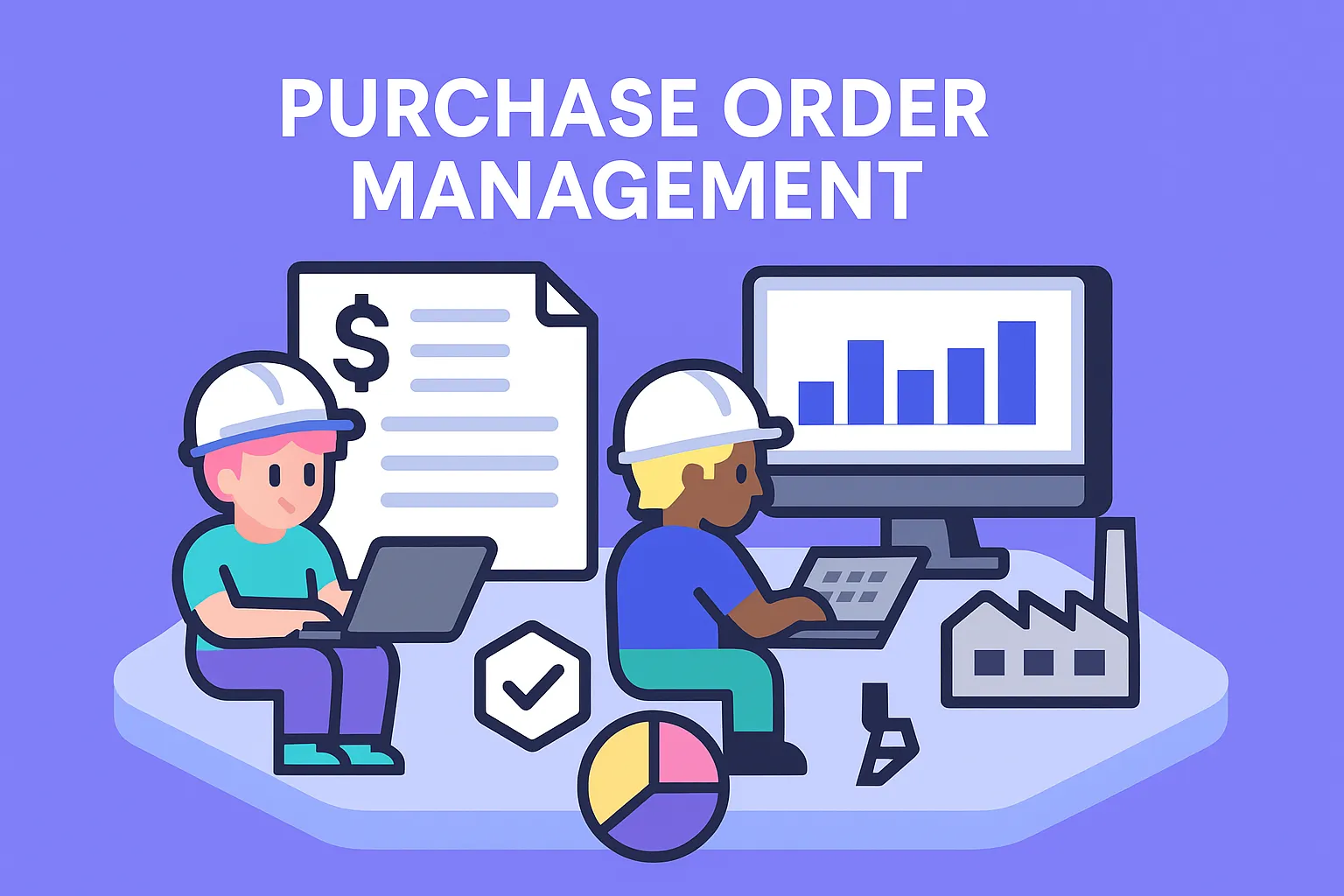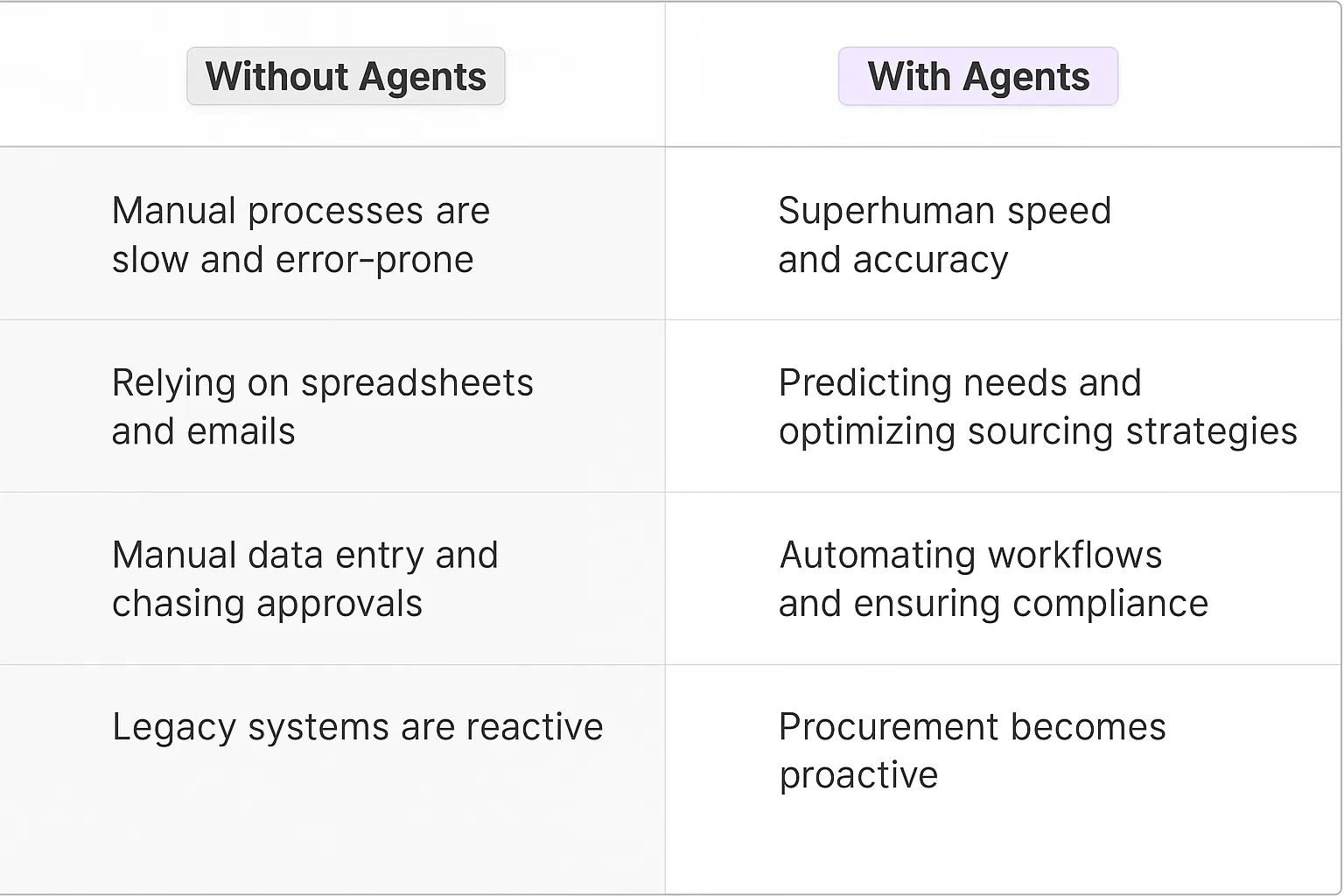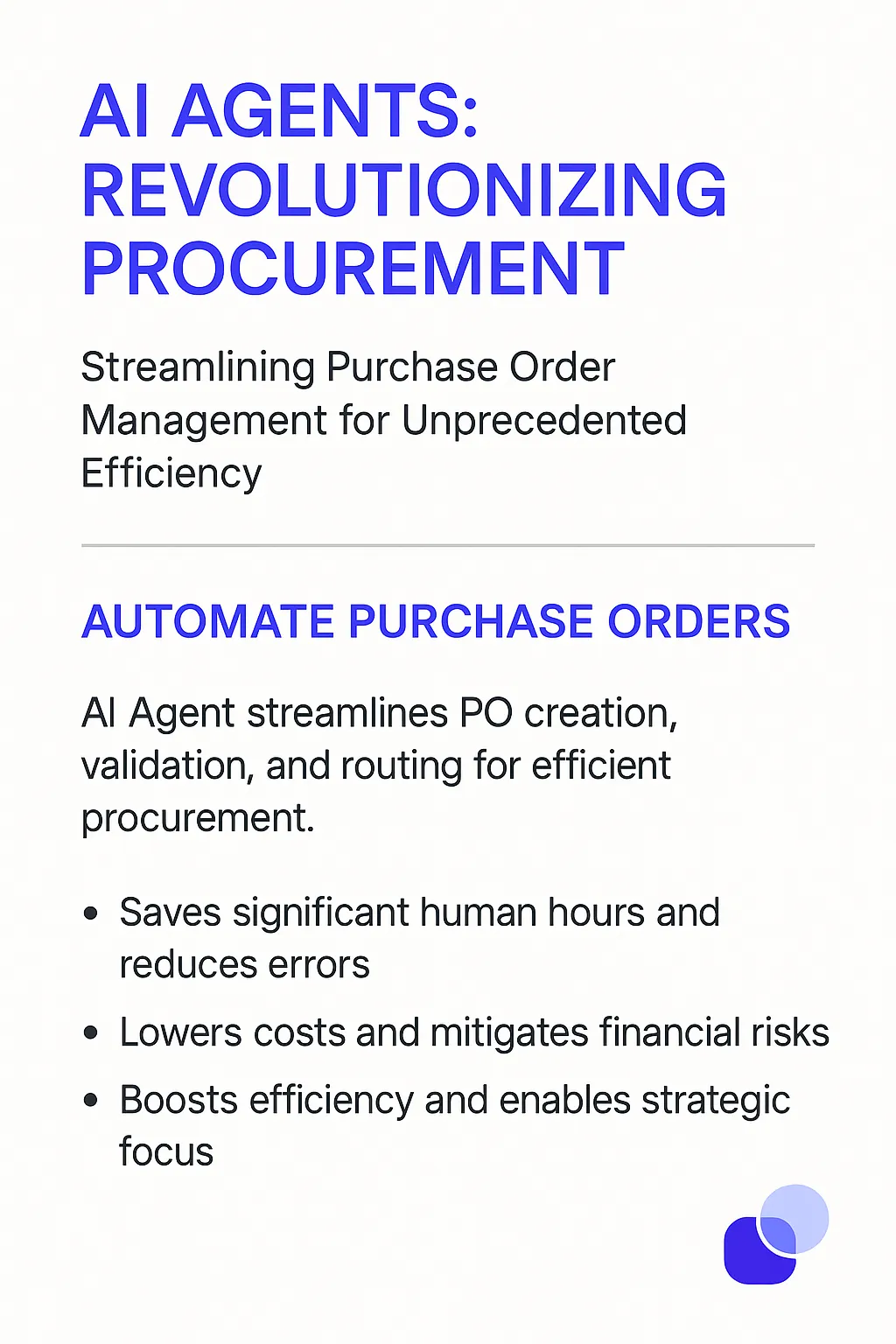Purchase Order Management AI Agents
The Evolution of Purchase Order Management with AI
What is Purchase Order Management?
Purchase Order Management is the process of creating, tracking, and managing purchase orders throughout their lifecycle. It's a critical function in procurement that ensures businesses acquire the right goods and services at the right time and price. Traditionally, this process has been labor-intensive and prone to errors, but AI is changing the game.
Key Features of Purchase Order Management
Effective Purchase Order Management typically includes:1. Order creation and approval workflows2. Vendor selection and management3. Budget tracking and forecasting4. Inventory management integration5. Compliance and policy enforcement6. Data analysis and reportingAI agents are enhancing these features by bringing automation, predictive analytics, and intelligent decision-making to the table. They're not just tools; they're digital teammates that are learning and adapting to make procurement more strategic and efficient.

Benefits of AI Agents for Purchase Order Management
What would have been used before AI Agents?
Before AI agents entered the scene, purchase order management was a tedious, manual process. Teams relied on a combination of spreadsheets, email chains, and legacy software systems. It was like trying to navigate a maze blindfolded while juggling flaming torches. Procurement specialists spent countless hours inputting data, chasing approvals, and reconciling discrepancies. The result? A slow, error-prone process that left businesses vulnerable to costly mistakes and missed opportunities.
What are the benefits of AI Agents?
Enter AI agents for purchase order management – the game-changer we've been waiting for. These digital teammates are like having a team of procurement ninjas working 24/7, never needing coffee breaks or vacation time.
First off, AI agents bring superhuman speed and accuracy to data processing. They can scan, interpret, and categorize purchase orders faster than you can say "cost savings." This isn't just about speed; it's about unlocking a new level of operational efficiency that was previously unimaginable.
But here's where it gets really interesting: AI agents don't just process data; they learn from it. They start recognizing patterns in your purchasing behavior, identifying potential savings opportunities, and even predicting future needs. It's like having a crystal ball for your supply chain.
Let's talk about compliance. AI agents are relentless rule-followers. They ensure every purchase order adheres to company policies and regulatory requirements. No more worrying about rogue spending or audit nightmares. These digital teammates have got your back.
And then there's the holy grail of procurement: strategic sourcing. AI agents can analyze vast amounts of market data, supplier performance metrics, and internal demand patterns to recommend optimal sourcing strategies. They're not just managing purchase orders; they're driving business strategy.
But perhaps the most transformative benefit is how AI agents free up human talent. Your procurement team can finally break free from the shackles of routine tasks and focus on high-value activities like relationship building and strategic planning. It's not about replacing humans; it's about augmenting their capabilities and unleashing their full potential.
In essence, AI agents for purchase order management aren't just an upgrade; they're a complete paradigm shift. They're turning a traditionally reactive function into a proactive, strategic powerhouse. And for businesses ready to embrace this change, the competitive advantage will be nothing short of extraordinary.

Potential Use Cases of AI Agents with Purchase Order Management
Processes
AI agents are reshaping the landscape of purchase order management, bringing a level of efficiency and intelligence that's frankly mind-blowing. These digital teammates are not just automating tasks; they're elevating the entire process to a new stratosphere.
One of the most impactful use cases is in vendor selection and negotiation. AI agents can analyze historical data, market trends, and vendor performance to recommend the optimal suppliers for each purchase order. They're like having a seasoned procurement expert on steroids, capable of processing vast amounts of data in seconds to make informed decisions.
Another game-changing process is budget forecasting and allocation. AI agents can predict future spending patterns based on historical data, seasonal trends, and market conditions. This allows companies to allocate budgets more effectively, avoiding overspending and identifying potential savings opportunities. It's like having a crystal ball for your procurement department.
Tasks
When it comes to specific tasks, AI agents are absolute beasts. They can handle purchase order creation with unprecedented speed and accuracy. By learning from past orders and understanding company policies, these digital teammates can generate POs that are not just correct, but optimized for cost and efficiency.
Approval workflows are another area where AI agents shine. They can route purchase orders to the right approvers based on company hierarchy, order value, and product category. But here's where it gets really interesting: they can also flag unusual orders or potential policy violations, acting as a first line of defense against errors or fraud.
Perhaps one of the most valuable tasks these AI agents can perform is spend analysis. They can dive deep into purchase order data, identifying patterns and anomalies that human analysts might miss. This could uncover opportunities for bulk purchasing, reveal maverick spending, or highlight vendors who consistently deliver late or over budget.
The potential of AI agents in purchase order management is massive. They're not just tools; they're digital teammates that are transforming how businesses handle procurement. As these agents continue to evolve and learn, we're going to see a seismic shift in how companies manage their purchasing processes. It's not just about efficiency anymore; it's about gaining a competitive edge through smarter, data-driven procurement strategies.

Industry Use Cases: AI Agents in Purchase Order Management
The versatility of AI agents in purchase order management makes them valuable across various industries. Let's dive into some meaty, industry-specific use cases that showcase how AI can transform workflows and processes. These aren't your run-of-the-mill examples; we're talking about AI that's so deeply integrated into operations, it's like having a digital teammate who never sleeps, never complains, and always delivers.
From manufacturing giants to nimble startups, organizations are leveraging AI to tackle the complexities of purchase order management. We're seeing AI agents that don't just process data, but actually learn from each transaction, continuously improving their performance. They're not just following rules; they're uncovering patterns and insights that human operators might miss.
In the following examples, we'll explore how AI is being deployed in ways that go beyond simple automation. We're talking about AI that's making decisions, predicting trends, and even negotiating with suppliers. It's a level of sophistication that's changing the game for businesses across the board.
Manufacturing: Precision-Driven Purchase Order Management
The manufacturing industry is ripe for a Purchase Order Management AI revolution. Let's dive into how these digital teammates can transform the way factories handle their supply chains and procurement processes.
In a typical manufacturing setup, purchase orders are the lifeblood of operations. They're the connective tissue between raw material suppliers and production lines. But here's the kicker: traditional PO management is often a mess of spreadsheets, emails, and manual data entry. It's slow, error-prone, and about as exciting as watching paint dry.
Enter the Purchase Order Management AI. This isn't just a fancy Excel replacement. We're talking about a digital teammate that can predict material needs based on production schedules, negotiate with suppliers in real-time, and optimize inventory levels like a chess grandmaster plans their next move.
Imagine a car manufacturing plant. The AI constantly monitors production rates, market demand, and supplier performance. It spots a potential shortage of microchips three months out. Instead of waiting for a human to notice and react, the AI proactively reaches out to approved suppliers, compares prices and lead times, and drafts purchase orders for review.
But it doesn't stop there. The AI learns from every interaction. It starts to recognize patterns in supplier behavior, market fluctuations, and even geopolitical events that could impact the supply chain. It becomes a strategic asset, providing insights that can shape long-term procurement strategies.
The result? A manufacturing operation that's not just efficient, but adaptive and resilient. It's the difference between a factory that's always playing catch-up and one that's setting the pace for the entire industry.
This isn't science fiction. It's the near future of manufacturing, powered by AI that understands the nuances of purchase order management. And for the companies that adopt early, it's going to be a massive competitive advantage. The kind that doesn't just shave off a few percentage points of cost, but fundamentally reshapes what's possible in manufacturing efficiency and agility.
Construction: AI-Powered Purchase Order Precision
The construction industry is about to experience a seismic shift in how it handles purchase orders, and AI is the wrecking ball that's going to demolish old inefficiencies. Let's break ground on how Purchase Order Management AI is reshaping the landscape of construction procurement.
Construction projects are notoriously complex beasts. They're a symphony of timing, materials, and labor that would make even the most seasoned conductor sweat. Traditional PO management in this space has been like trying to build a skyscraper with a rusty toolbox – clunky, time-consuming, and prone to costly mistakes.
Now, picture a high-rise project in downtown Manhattan. The AI isn't just managing purchase orders; it's orchestrating a ballet of supply and demand with the precision of a Swiss watch. It's analyzing historical data, current market conditions, and project timelines to optimize every order.
This AI doesn't just react; it anticipates. It spots potential material shortages before they become critical. It identifies opportunities for bulk purchases across multiple projects, leveraging economies of scale that a human manager might miss. And when unexpected changes hit – like a sudden spike in steel prices – it adapts on the fly, suggesting alternative suppliers or materials that keep the project on track and on budget.
But here's where it gets really interesting: the AI starts to understand the unique rhythms of construction. It learns that weather patterns in New York can delay concrete pours, affecting the timing of subsequent material orders. It recognizes that certain subcontractors consistently underestimate their material needs and adjusts purchase orders accordingly.
The impact? Projects that once faced constant delays and budget overruns now run with the smoothness of a well-oiled machine. Site managers spend less time buried in paperwork and more time focusing on the actual build. And the ripple effects are huge – from improved cash flow to better relationships with suppliers.
This isn't just about cutting costs (though that's a nice bonus). It's about unlocking new levels of efficiency and reliability in an industry that's been starving for innovation. The construction firms that embrace this tech won't just be building structures; they'll be constructing a new paradigm for how large-scale projects are managed and executed.
The future of construction isn't just about bigger cranes or stronger materials. It's about smarter, AI-driven systems that turn the chaos of construction into a finely tuned operation. And for the early adopters, it's going to be like bringing a power tool to a hand-saw competition.
Considerations
Technical Challenges
Implementing a Purchase Order Management AI Agent isn't just about slapping some machine learning on top of your existing processes. It's a complex dance of data, algorithms, and systems integration that can make or break your procurement game.
First up, data quality. Your AI is only as good as the data it's fed. If your historical purchase order data is a mess of inconsistencies, duplicates, and errors, your AI agent will struggle to make sense of it all. It's like trying to teach a kid math using a textbook where half the numbers are smudged.
Then there's the challenge of integrating the AI agent with your existing ERP and procurement systems. These legacy systems often speak different languages, and getting them to play nice with a new AI teammate can be like herding cats. You'll need robust APIs and middleware to bridge these gaps.
Let's not forget about scalability. As your business grows, can your AI agent keep up? It needs to handle increasing volumes of purchase orders without breaking a sweat or slowing down. This requires some serious computational muscle and clever architecture design.
Operational Challenges
On the operational side, things get even trickier. You're essentially asking your procurement team to trust a digital teammate with critical business decisions. That's a tough sell, especially for the old guard who've been doing things their way for decades.
Change management becomes crucial. You need to convince your team that this AI agent isn't here to replace them, but to augment their capabilities. It's about showing them how the AI can take over the mundane tasks, freeing them up for more strategic work. But let's be real, people are resistant to change, and you'll need a solid plan to overcome this inertia.
Training is another beast altogether. Your team needs to learn how to work alongside this AI agent effectively. It's not just about using a new tool; it's about developing a new workflow and decision-making process. This requires time, resources, and patience - all of which are often in short supply.
Lastly, there's the ongoing challenge of monitoring and improving the AI's performance. Machine learning models can drift over time, becoming less accurate as business conditions change. You need a system in place to continuously evaluate the AI's decisions and retrain it when necessary. It's like having a high-maintenance employee who needs constant supervision and coaching.
Implementing a Purchase Order Management AI Agent is no walk in the park. But for those who can navigate these challenges, the potential rewards in efficiency, cost savings, and strategic insights are massive. It's a classic high-risk, high-reward play in the world of enterprise tech.
The Future of Procurement: AI as the New Standard
AI agents are not just an incremental improvement in purchase order management; they're a paradigm shift. They're turning a traditionally reactive, manual process into a proactive, strategic function that drives business value. From manufacturing to construction, these digital teammates are reshaping how businesses handle procurement, offering unprecedented efficiency, accuracy, and insights.
However, the journey to AI-powered procurement isn't without its challenges. Technical hurdles like data quality and system integration, along with operational challenges such as change management and ongoing performance monitoring, need to be addressed. But for organizations willing to take the leap, the rewards are substantial.
As we look to the future, it's clear that AI in purchase order management isn't just a trend – it's the new standard. Companies that embrace this technology early will gain a significant competitive edge, not just in cost savings, but in their ability to adapt to market changes and drive strategic growth. The question isn't whether AI will transform procurement, but how quickly businesses will adapt to this new reality.













